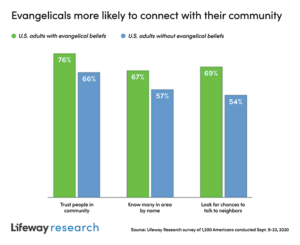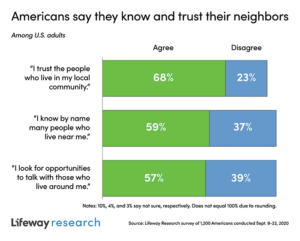By Aaron Earls
 Writer, Lifeway Christian Resources
Writer, Lifeway Christian Resources
NASHVILLE — Despite quarantines and social distancing keeping people in their homes during the pandemic, Americans still say they know their neighbors.
Almost 7 in 10 U.S. adults (68 percent) say they trust the people who live in their local community, according to a study from Nashville-based Lifeway Research. Close to a quarter of Americans (23 percent) disagree, and 10 percent say they aren’t sure.
“Trust is the basis of a peaceful society,” said Scott McConnell, executive director of Lifeway Research. “It’s a hopeful sign that amid months of distancing and political unrest more than two-thirds of Americans trust those in their community.”
Men (72 percent) are more likely than women (63 percent) to say those who live around them are trustworthy. Those 65 and older are most likely to agree (79 percent), while younger adults, aged 18-34, are least likely to agree (59 percent).
Residents of the South (24 percent) are more likely than those in the Midwest (18 percent) to disagree and say they don’t trust the people who live in their community.
Religious identification and practice also play a role in the likelihood someone is trusting of those in their neighborhood. Protestants (71 percent) and Catholics (69 percent) are more likely to agree than the religiously unaffiliated (60 percent). Americans with evangelical beliefs (76 percent) are also more likely to trust their community than those without evangelical beliefs (66 percent).
Specifically among those who identify as Christian, those who attend church services at least four times a month (17 percent) are less likely than those who attend less than once a month (25 percent) to express doubt about trusting the people who live near them.
Where Everyone Knows Your Name
 Six in 10 Americans (59 percent) say they know the names of many people who live near them. More than a third (37 percent) disagree, and 4 percent aren’t sure.
Six in 10 Americans (59 percent) say they know the names of many people who live near them. More than a third (37 percent) disagree, and 4 percent aren’t sure.
Those with a bachelor’s degree or more (65 percent) are more likely than those who have a high school diploma or less (55 percent) to know those in their neighborhood by name. Among religious groups, the unaffiliated are most likely to disagree (44 percent).
Christians who attend church at least monthly (71 percent) are more likely than those who attend less frequently (51 percent) to say they know the names of their neighbors. American adults who hold evangelical beliefs (67 percent) are also more likely than those without such beliefs (57 percent) to say they know the people who live near them by name.
“Remembering the names of people you meet is the first sign that you care about them,” said McConnell. “For Christians, caring can also include praying for those individuals by name and for their relationship with God.”
Time to Talk
The conversations may have taken place through masks or six feet apart, but most U.S. adults are seeking chances to have a conversation with their neighbors.
Almost 3 in 5 Americans (57 percent) say they look for opportunities to talk with the people who live around them. Four in 10 disagree (39 percent), and 3 percent aren’t sure.
 Again, men (65 percent) are more likely than women (50 percent) to seek out such moments of conversation. Those 65 and older (69 percent) are the age range most likely to agree.
Again, men (65 percent) are more likely than women (50 percent) to seek out such moments of conversation. Those 65 and older (69 percent) are the age range most likely to agree.
Those with a bachelor’s degree (66 percent) or a graduate degree (64 percent) are more likely than those with a high school diploma or less (51 percent) to look for opportunities to talk with neighbors.
The religiously unaffiliated are the most likely to want to stick to themselves, as 49 percent disagree they are seeking such community conversations.
Christians who attend church at least monthly (71 percent) are more likely than those who attend less frequently (51 percent) to be actively looking to talk to those who live around them. Those with evangelical beliefs (69 percent) are also more likely than those without such beliefs (54 percent) to be actively wanting those times of discussion.
“Those with lower trust and fewer connections in the community are also the groups less likely to want to seek out conversations with others. This is true of the religiously unaffiliated and those with a lower socioeconomic level,” said McConnell.
“Despite a greater interest in talking with neighbors among Christians who frequently attend church, a Lifeway Research study before COVID revealed that these conversations do not always include faith. In fact, 55 percent of Protestant churchgoers had not shared with anyone how to become a Christian in the previous six months.” B&R
